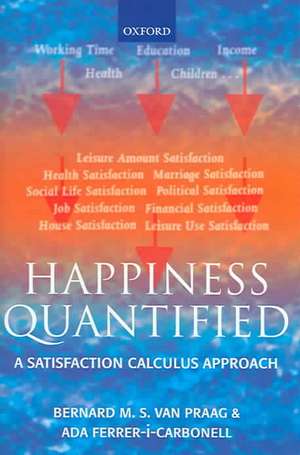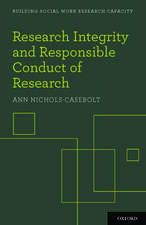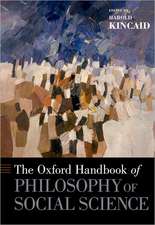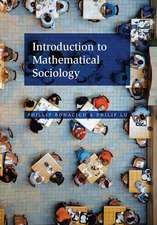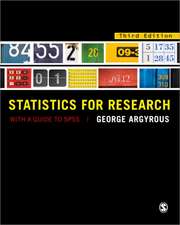Happiness Quantified: A Satisfaction Calculus Approach
Autor Bernard van Praag, Ada Ferrer-i-Carbonellen Limba Engleză Hardback – 6 apr 2004
Preț: 747.59 lei
Preț vechi: 1131.17 lei
-34% Nou
Puncte Express: 1121
Preț estimativ în valută:
143.05€ • 149.76$ • 118.37£
143.05€ • 149.76$ • 118.37£
Carte tipărită la comandă
Livrare economică 25-31 martie
Preluare comenzi: 021 569.72.76
Specificații
ISBN-13: 9780198286547
ISBN-10: 0198286546
Pagini: 368
Ilustrații: numerous line drawings and tables
Dimensiuni: 164 x 242 x 25 mm
Greutate: 0.69 kg
Editura: OUP OXFORD
Colecția OUP Oxford
Locul publicării:Oxford, United Kingdom
ISBN-10: 0198286546
Pagini: 368
Ilustrații: numerous line drawings and tables
Dimensiuni: 164 x 242 x 25 mm
Greutate: 0.69 kg
Editura: OUP OXFORD
Colecția OUP Oxford
Locul publicării:Oxford, United Kingdom
Recenzii
Unlike other books that were published on this same topic before it, Hapiness Quantified is jam-packed with statistical theories, econometric models, policy applications, and not to mention a whole lot of numbers.
The book constitutes an important contribution to the economics of happiness, in particular because of its rigorous econometric techniques. Its approach will be appealing for economists and for all those social scientists interested in quantitative analysis.
This book is timely, coming in themiddle of anupsurge of interest in happiness, satisfaction, and other measures of utility-related concepts.
It is written as a technical text, but for the interested reader with training in economics it is accessible, indeed highly readable... highly original... Welfare economics clearly has been substantially enriched by Van Praags and his colleagues' work.
Happiness Quantified does what it promises: Provides excellent quantitative analysis on happiness research, and thus provides an important contribution to the literature.
Simultaneously an authoritative and readable introduction to happiness economics for the novice and a treasure trove for all scholars in this field...refreshing
The book constitutes an important contribution to the economics of happiness, in particular because of its rigorous econometric techniques. Its approach will be appealing for economists and for all those social scientists interested in quantitative analysis.
This book is timely, coming in themiddle of anupsurge of interest in happiness, satisfaction, and other measures of utility-related concepts.
It is written as a technical text, but for the interested reader with training in economics it is accessible, indeed highly readable... highly original... Welfare economics clearly has been substantially enriched by Van Praags and his colleagues' work.
Happiness Quantified does what it promises: Provides excellent quantitative analysis on happiness research, and thus provides an important contribution to the literature.
Simultaneously an authoritative and readable introduction to happiness economics for the novice and a treasure trove for all scholars in this field...refreshing
Notă biografică
B. M. S. van Praag studied econometrics at the University of Amsterdam where he defended his dissertation on "Individual Welfare and the Theory of Consumer Behaviour" cum laude in 1968. Between 1969 and 1992 he held consecutive positions as Professor at the Free University of Brussels, Associate Professor at Erasmus University, Rotterdam, Professor of Economics at the University of Leiden, and Professor at Erasmus University. In 1992 he was appointed Professor in Applied Economic Research at the University of Amsterdam and Managing Director of the Foundation for Economic Research. In 2000 he became University Professor at the University of Amsterdam. He was the founding president of the European Society for Population Economics, and has been co-editor of the Journal of Population Economics, a member of the Dutch Social Economic Council, and a member of the Dutch Scientific Council for Government Policy.Ada Ferrer-i-Carbonell graduated in Economics at the Universitat Autònoma de Barcelona in 1994. In 1997 she received a Fulbright scholarship to do graduate studies at Rensselaer Polytechnic Institute (RPI) (Troy, NY, USA), where she obtained an M.S. in Economics. In 1999 she joined the Faculty of Economics and Econometrics at the University of Amsterdam and the Tinbergen Institute Amsterdam, where in 2003 she obtained her PhD on applied welfare economics supervised by B.M.S. van Praag. In the same year, she obtained a second PhD on ecological economics from RPI. She currently works for the Amsterdam Institute for Advanced Labour Studies at the University of Amsterdam.
